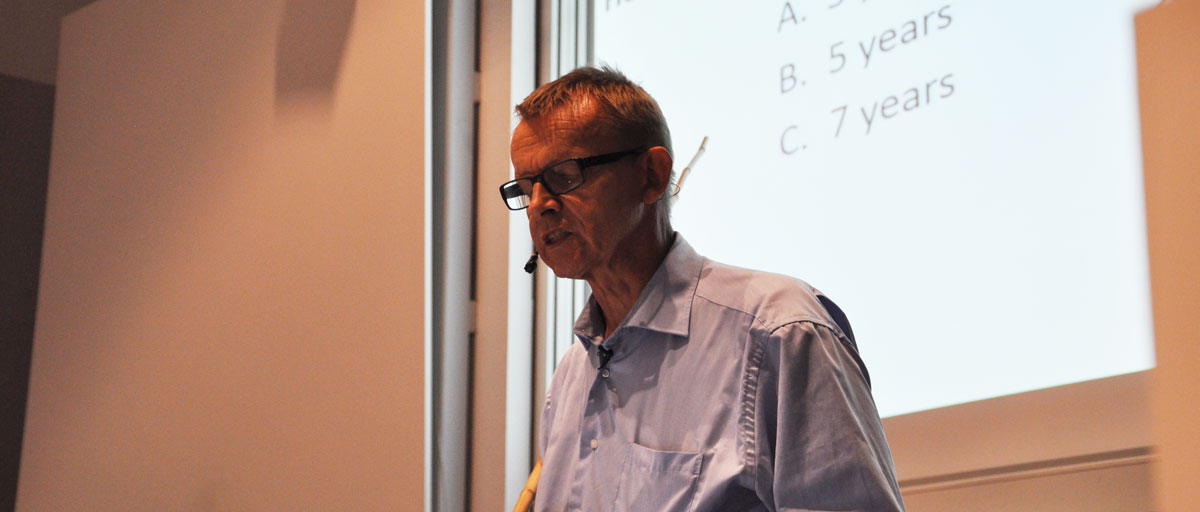
Professor Hans Rosling passed away on 7 February, 2017. Rosling was a highly appreciated lecturer at the centre's course Världens Eko for many years, his contributions were invaluable. Photo: H. Pompeius
Bildtext får vara max två rader text. Hela texten ska högerjusteras om den bara ska innehålla fotobyline! Photo: B. Christensen/Azote
in memory of
A voice for hope and statistical clarity
Johan Rockström reflects on the contributions made by Hans Rosling, statistician and development expert, who passed away 7 February, 2017
Text
The world has lost a great academic, whole hearted humanist, and creative artist. International health professor Hans Rosling, our global teacher on wealth, people and development, has passed away. This is a large loss. Nobody, in this world, filled the knowledge gap on the advancements in human wealth among the poorest nations, as he did. Nobody, communicated so powerfully and eloquently, with such sharpness and artistic bravado, the facts of the demographic transition, the positive tipping point of drastic decline in fertility rates among women in Africa, as he did. Nobody, could combine statistics with razor sharp critique and unforgettable jokes and farce, as Hans. Nobody argued so convincingly against the population explosion and irreversible poverty, as he did. Nobody, in fact, could convey so much hope, for human wealth and dignity among the world's poor nations, as he could. He translated statistics into facts. Facts into insights, and insights into emotion and values. No wonder he was received, almost as an enlightened academic Messiah, in a world that is so dominated by darkness.
Hans was a respected scholar on the big global stages. He had his feet deeply rooted in the African reality, after years in Mozambique and more recently active engagement in the fight against Ebola.
He was Sweden's most frequent TED global speaker, a World Economic Forum plenary actor, advisor to heads of state and global philanthropists, like Bill Gates. Media often portrayed him as an icon and popstar. But that just shows how little they knew him. Hans had only one goal - to contribute to a better world. To enlighten our minds on the potential of young girls in Nigeria, and ensure that we are not stuck in an erroneous world view dated 1960. He saw media as his tool, a trampoline for knowledge sharing and deep insights. Never, as a way to make himself known.
The world will be a less enlightened and an emptier place without him, and we all have a responsibility to carry on his legacy - of using facts to convey insights for human development for all on Earth.
We who have had the privilege to work and share jokes and debates with him, know that he could be stubborn, not based on opinion, but based on numbers and conviction. But, equally, he was hungry for new perspectives, and loved to engage in long and deep discussions on the links between human wealth and planetary health. We had, Hans and I, our disagreements. But we equally, had, our deep agreements. Hans was known for his human fertility statistics. But we came, together, to take a joint position on soil fertility. He was equally optimistic as I am on the potential for sustainable intensification of food production in Africa. African farmers use on average below 10 kg per hectare and year of nitrogen and phosphorus fertilisers. To enable positive human development in Africa we need a new doubly green revolution that is both sustainable and productive. A common miss-conception (e.g., among many European environmentalists) is that Africa should do this by transitioning from its current 1-ton agriculture to ecological agriculture, i.e., to entirely exclude African farmers from fertiliser use. We both agreed to run a lecture campaign explaining that this is to condemn Africa to misery. Instead we need “nutrient justice”, a global equity redistribution of N and P fertilisers - where countries like Sweden, UK and the US must drastically reduce fertiliser-overuse (which pollutes waterways and has caused marine dead zones) and redistribute this to small-scale farmers around the world, with Africa as the global hotspot. Nobody could convey this pragmatic approach to nutrient justice and food wealth as Hans.
The world will be a less enlightened and an emptier place without him, and we all have a responsibility to carry on his legacy - of using facts to convey insights for human development for all on Earth. Hans, if he had been active on the stages of the world over the past few months, would have been one of our strongest voices against "Alternative facts" and the "post-truth" trend we are seeing today. There is much to be inspired by, when reflecting back on Hans’ lifework. Two aspects, of acute importance today, are courage and clarity. As when he berated the Danish television program host Adam Holm, who refused to accept that there is a rapidly rising lower-middle class also in Africa, by simply stating, "this is nothing you can discuss, I am right and you are wrong".
- Johan Rockström
Hans Rosling delivered one of the most popular TED talks of all times:






